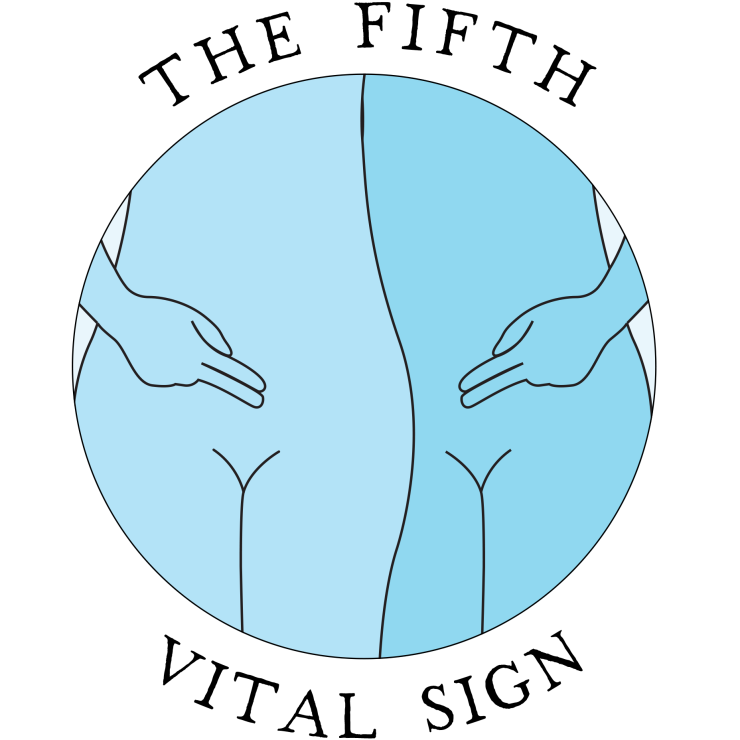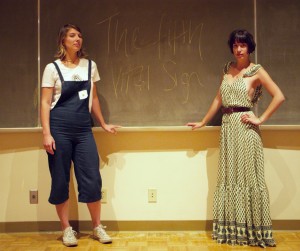Guest Post by Kelsey Knight and Emily Varnam
For three months this year, Kelsey and Emily, a doula and nurse duo, traversed the United States by car offering free reproductive health classes in over 60 locations. They called the project The Fifth Vital Sign, and their mission is to use education as preventative care, encouraging individuals to make informed choices about their health. They hope that by spreading free, reproductive health information in a fair, non-judgmental manner, we will all feel more secure, safe, and alive in our bodies.
 The name of the project—The Fifth Vital Sign—has an important history, rich with evidence that the menstrual cycle is, in fact, a vital sign, as indicative of well-being as blood pressure, heart rate, temperature, and respiratory rate. In 2004, the Society for Menstrual Cycle Research (SMCR) co-sponsored a scientific forum called “The Menstrual Cycle Is A Vital Sign,” during which medical experts presented research that showed why this is in fact the case. Building on this idea, the SMCR’s 2005 conference theme was: Menstruation: The Fifth Vital Sign. Ten years later, in December 2015, The American College of Obstetricians and Gynecologists’ Committee on Adolescent Health Care published this Committee Opinion: Menstruation in Girls and Adolescents: Using the Menstrual Cycle as a Vital Sign.
The name of the project—The Fifth Vital Sign—has an important history, rich with evidence that the menstrual cycle is, in fact, a vital sign, as indicative of well-being as blood pressure, heart rate, temperature, and respiratory rate. In 2004, the Society for Menstrual Cycle Research (SMCR) co-sponsored a scientific forum called “The Menstrual Cycle Is A Vital Sign,” during which medical experts presented research that showed why this is in fact the case. Building on this idea, the SMCR’s 2005 conference theme was: Menstruation: The Fifth Vital Sign. Ten years later, in December 2015, The American College of Obstetricians and Gynecologists’ Committee on Adolescent Health Care published this Committee Opinion: Menstruation in Girls and Adolescents: Using the Menstrual Cycle as a Vital Sign.
Twelve years after SMCR first discussed the menstrual cycle as a vital sign, the matter is still up for debate. In 2004, Elizabeth Kissling, PhD, opened up the SMCR scientific forum by presenting on how menstruation is portrayed in the media. We wish we had been there, in order to both appreciate how much progress we’ve made and acknowledge how much farther we need to go. Just last week we read an article in The New York Times and watched a video at The Guardian that questioned the necessity of menstruation and failed to mention how ovulation is beneficial, or how, according to the ACOG statement, if “the menstrual cycle does not function within normal parameters, general health is at risk because multiple body systems are impacted by menstrual dysfunction.”
In the NYT’s article, Katie Rogers writes: “But one of the reasons many women don’t try period suppression is that they’ve been conditioned to believe that a monthly period is a sign of good health.” Conditioned? It’s evidence-based, and push-back to the piece included this article on 5 Reasons To Have a Period. Rogers concedes that women who don’t have a regular period should see a medical professional, hinting that the menstrual cycle and health are intertwined, but goes no further. Where are the balanced, evidence-based resources for information about the menstrual cycle?
Hello, The Fifth Vital Sign. The name was Emily’s idea. In a moment of divine inspiration, the name came to her. Perhaps she’d read ACOG’s recommendation, or come across the idea in her research years earlier on fertility awareness. It was perfect for the project: inclusive, not gendered, and scientific without being inaccessible. Emily thought of an apt hand sign for the project, too. In the same way that you would check your radial pulse with your pointer and middle fingers, you instead place those fingers above the mons pubis, where the uterus rests, so that you are checking on or “listening” to the uterus, to the menstrual cycle.
The reaction to our project has been overwhelmingly positive. We raised over $7,000 via Kickstarter for The Fifth Vital Sign, evidence of support from hundreds of men and women, and of a collective desire for this information to be more widespread and accessible. We relied on the kindness of strangers throughout our travels. Strangers who quickly became friends would contact us after learning of the project and invite us to their communities to present. People showed up over and over and over again. We drove to a class in Starkville, Mississippi where more than eighty people greeted us. People are hungry for more information about their bodies, especially when it’s presented in a certain way. We trust people to make the best decisions for their own bodies when they know their options and have access to unbiased information about risks and benefits.
Collectively, we are moving in a #MenstruationMatters direction. 2015 was The Year of the Period, and Abby Epstein and Ricki Lake described the flourishing pro-period movement in Grok Nation. Their documentary about the risks of hormonal contraception, based on Sweetening The Pill by Holly Grigg-Spall, is in production. And The Fifth Vital Sign is on the ground, grassroots style.
“…we were able to listen to so many stories that spoke to the urgency and magnitude of the need to know more about our bodies.”
We drove 15,000 miles to connect with people in person, offer information and resources, and acknowledge the wonderment of our cycling bodies. By “gathering in all five senses,” as Gloria Steinem wrote, we were able to listen to so many stories that spoke to the urgency and magnitude of the need to know more about our bodies. We plan to share these stories and document our journey in an upcoming book we are writing, while also continuing to offer workshops and one on one consultations. We are also creating a teacher training program so that more people will be able to share these classes with their communities.
Kelsey Knight is a labor and delivery nurse, lactation consultant, and childbirth educator, who is passionate about health as a human right and documenting people’s stories. Emily Varnam is a birth and postpartum doula, midwives’ assistant, birth control doula, and holds a degree in counseling and mentoring.



Such a fantastic initiative, Kelsey and Emily! Yes, that Guardian video and NYT article were really worrying. We need a concerted effort to confront the growing normalisation of menstrual suppression. Katie Hasson’s paper in Gender and Society this week showed how pharmaceutical companies are repositioning the “pill bleed’ now as not menstruation anyway (having fudged that issue and presented it as menstruation for decades) so no problem to drop it altogether, in a clever misdirect of the real issue that ovulation is vital to short and long term health. What you are doing is so important.